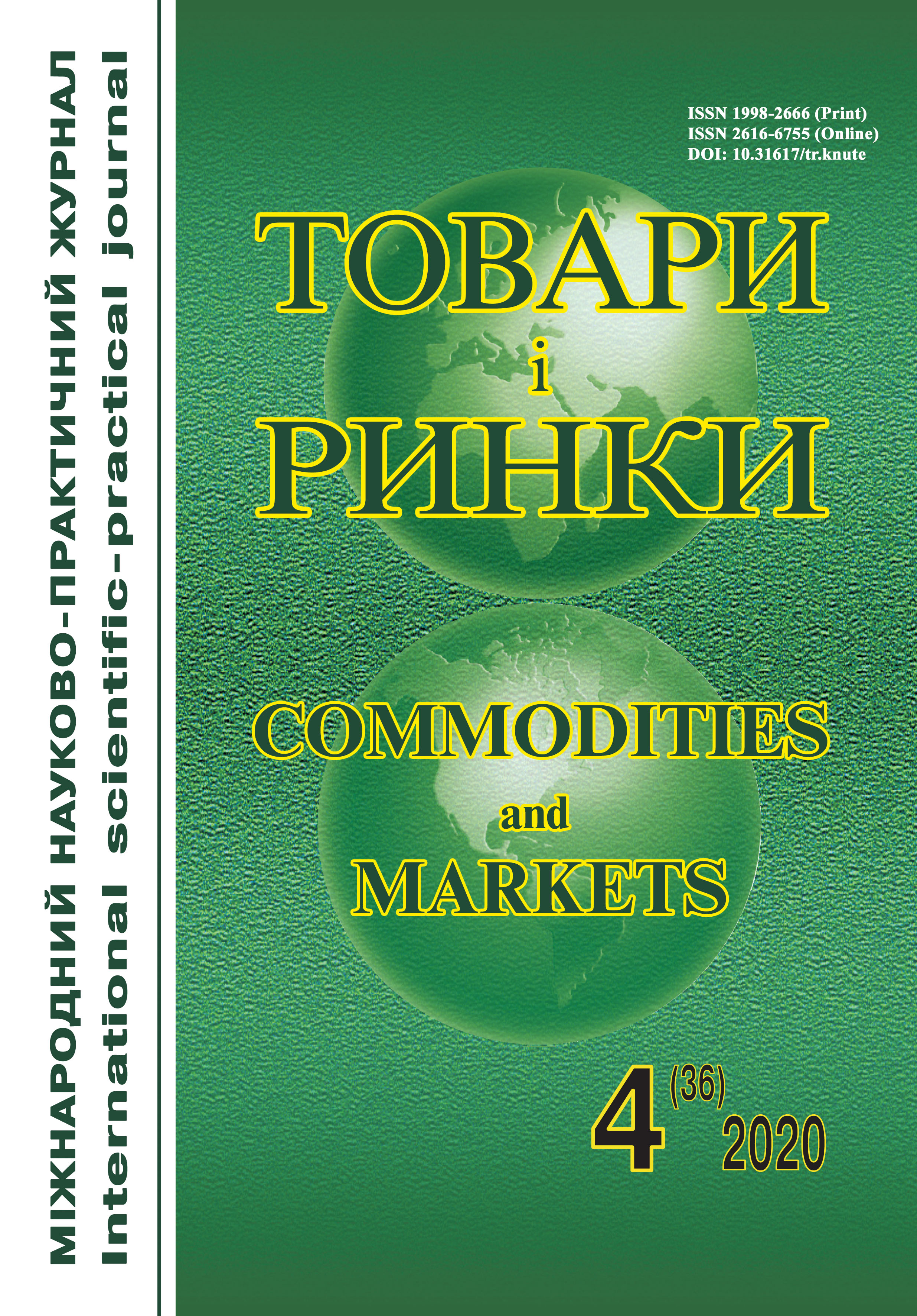Ecologization of joint production of alcohol and bakery yeast from molasses
DOI:
https://doi.org/10.31617/tr.knute.2020(36)07Keywords:
molasses, alcohol, baker’s yeast, fermentation, alcohol brew, post-alcoholic waste, technologyAbstract
Background. The disadvantage of the two-product technology of alcohol and baker’s yeast from molasses is the need to limit the concentration of dry matter of the source medium to 22% and, accordingly, the level of alcohol accumulation in mature malt not more than 8.0% vol. to prevent deterioration of baker’s yeast. The consequence of this is the high specific cost of steam for bragorectification and increase the specific yield of post-alcohol molasses bard in comparison with single-product technology (obtaining only alcohol).
Materials and methods. Raw materials, intermediates and final products were analyzed according to the methods adopted in science and practice of molasses alcohol technology. The dry matter content; pH of the medium; the content of alcohol in the brew, yeast biomass and unfermented sugars; the lifting power of yeast and their color in the resulting products were determined.
Results. The possibility of reducing the volume of post-alcoholic molasses bard by returning it for the preparation of molasses bard without deteriorating the quality of baker’s yeast and alcohol yield, as well as by increasing the dry matter concentration of fermented wort from 22 (traditional technology) to 27% and accumulation of alcohol in mature brew up to 10–11% vol. has been experimentally proven.
Conclusion. The presented research results provide grounds for the development of energy-saving low-waste two-stage technology of alcohol and baking yeast from molasses, which can be used to obtain high-quality baking yeast to increase the concentration of alcohol in mature malt by more than 10% vol. This will significantly reduce the steam for bragorectification of alcohol and the volume of contaminated and difficult to dispose of production waste – post-alcohol molasses bard.
The implementation of such technology will be the next step in the greening of the joint production of alcohol and baker’s yeast from molasses.
References
Patil, N. P., & Patil, V. S. (2017). Fuel Ethanol from Cane Molasses: A Review of Feedstocks, Technologies, Opportunities and Challenges. J. Nat. Prod. Resour. (Vol. 3). (Issue 1), (pp. 104-110) [in English].
Zabed, Н., Faruq, G., Sahu, J. N., Azirun, M. S., Hashim, R., & Boyce, A. N. (2014). Bioethanol Production from Fermentable Sugar Juice. The Scientific World Journal. doi: ОRG/10.1155/2014/957102 [in English].
Pidgors’kyj, V. S., Iutyns’ka, G. O, & Pyrog, T. P. (2010). Intensyfikacija tehnologij mikrobnogo syntezu [Intensification of microbial synthesis technologies]. Kyi’v: Naukova dumka [in Ukrainian].
Kryvorot’ko, V. M., Saljuk, A. I., Romanova, Z. M., Satalkin, Ju. M., & Navroc’kyj, V. M. (2013). Osnovy ekologichnoi’ modernizacii’ pidpryjemstv harchovoi’ galuzi: metodologija, praktyka [Fundamentals of ecological modernization of food industry enterprises: methodology, practice]. Kyi’v: Vyshha shkola [in Ukrainian].
Typovyj tehnologichnyj reglament oderzhannja meljasno-spyrtovoi’ brazhky i presovanyh hlibopekars’kyh drizhdzhiv: TR U 18.8049 – 2004 [Typical technological regulations for obtaining molasses-alcohol mash and pressed baker’s yeast: TR U 18.8049 – 2004]. (2004). Kyi’v: UkrNDIspyrtbioprod: Ministerstvo agrarnoi’ polityky Ukrai’ny [in Ukrainian].
Domarec’kyj, V. A., Shyjan, P. L., Kalakura, M. M., Romanenko, L. F. Homichak, L. M., Vasylenko, O. O. et al. (2010). Zagal’ni tehnologii’ harchovyh vyrobnyctv [General technologies of food production]. Kyi’v: Universytet "Ukrai’na" [in Ukrainian].
Buhkalo, S. I., Ol’hovs’ka, O. I., Ol’hovs’ka, V. O., & Zipunnikov, M. M. (2019). Doslidzhennja ta analiz innovacijnyh zahodiv z tehnologii kompleksnoi’ utylizacii’ pisljaspyrtovoi’ bardy [Research and analysis of innovative measures for the technology of complex utilization of post-alcoholic bard]. Visnyk Nacional’nogo Tehnichnogo Universytetu "HPI". Serija: Innovacijni doslidzhennja u naukovyh robotah studentiv – Bulletin of the National Technical University "KhPI". Series: Innovative research in scientific works of students, 15, 66-73. doi: 10.20998/2220-4784.2019.15.12 [in Ukrainian].
Dubinina, A. A., Hackevych, Ju. M., Popova, T. M., & Lenert, S. O. (2016). Zagal’na tehnologija harchovyh vyrobnyctv [General technology of food production]. Harkiv: HDUHT [in Ukrainian].
Shvorov, S. A., & Polishhuk, V. M. (2019). Intensyfikacija procesu metanovogo brodinnja v biogazovyh ustanovkah na osnovi vykorystannja meljasnoi’ bardy [Intensification of the methane fermentation process in biogas plants based on the use of molasses bard]. Energetyka i avtomatyka – Energetics and automation, 1, 37. doi: 10.31548/energiya2019.01.037 [in Ukrainian].
Piddubnyj, V. A., Kravchenko, M. F., Chagajda, A. O., & Krasnozhon, S. V. (2017). Innovacijni tehnologii’ harchovyh vyrobnyctv [Innovative technologies of food production]. V. A. Piddubny (Ed.). Kyi’v: Kondor-Vydavnyctvo [in Ukrainian].
Koval’, O., & Olijnichuk, S. (2019). Vplyv necukriv meljasy na efektyvnist’ zbrodzhuvannja susla z cukrovmisnoi’ syrovyny [Influence of molasses non-sugars on the efficiency of wort fermentation from sugar-containing raw materials]. Visnyk agrarnoi’ nauky – Bulletin of Agricultural Science. (Vol. 97), 3, 63-68. doi: 10.31073/agrovisnyk201903-10 [in Ukrainian].
Levandovsky, L., Vitriak, O., Demichkovska, M. (2019). Biotechnology of alcohol fermentation with yeast recirculation. Food science and technology. (Vol. 13). (Issue 3), (pp. 4-9). doi: http://dx.doi.org/10.15673/fst.v13i3.1450 [in English].
Instrukcija po tehnohimicheskomu i mikrobiologicheskomu kontrolju spirtovogo proizvodstva: utv. Gosagropromom SSSR 15.01.1986 [Instructions for techno chemical and microbiological control of alcohol production: approved by Gosagroprom of the USSR 01/15/1986]. (1986). Moscow: Agropromizdat [in Russian].
Polygalina, G. V. (1999). Tehnohimicheskij kontrol’ spirtovogo i likerovodochnogo proizvodstva [Techno chemical control of alcohol and alcoholic beverage production]. Moscow: Kolos [in Russian].



